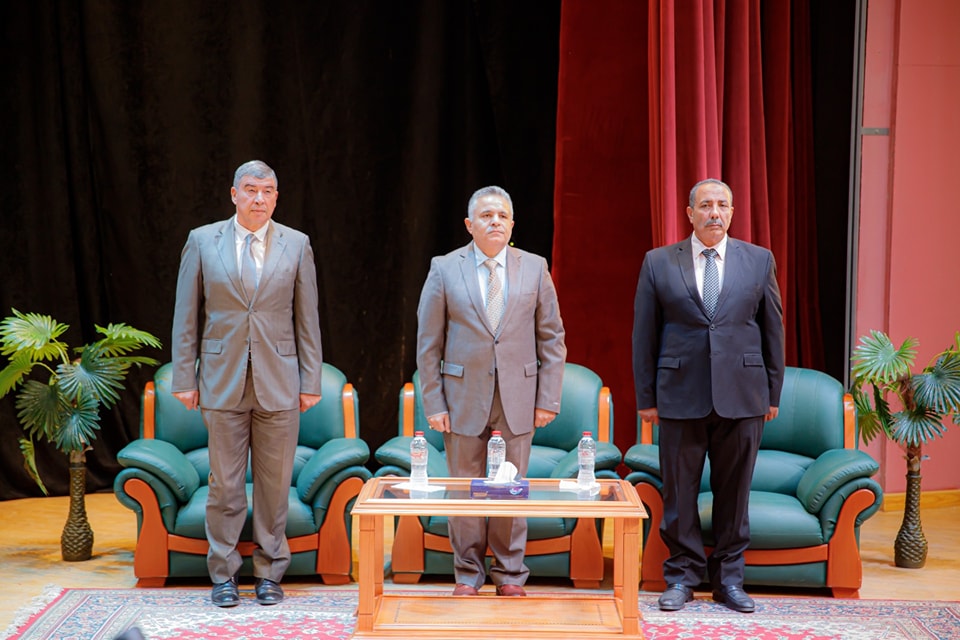In his office, Prof. Dr. Ashraf Hnijal, the SU President, met this morning General staff of War/ Safwat Al-Deeb, the Senior Strategist. It was attended by Dr. Abdullah Ramadan, the Governor's Deputy, and Mr. Khaled El-Saadawi, the Secretary General of the Governorate. The university organized an educational seminar which was attended by SU Vices-Presidents, deans of faculties, teaching staff, and students from various faculties. The symposium began with the play of the national anthem, and then the president gave a speech welcoming the university's great guest and appreciating his outstanding role in enlightening minds.
Moreover, Hnijal explained that Suez University is working on an ambitious strategic plan aimed at implementing an activity based on complementarity and cooperation between various institutions of the surrounding society. He also stated that the Suez Governorate is one of the most important cooperation partners with the University in order to achieve the best results in the development of society and provide various services to citizens. He stressed that this cooperation and its results in various sectors would not have occurred without the enlightened vision of His Excellency General/ Abdelmadjid Saqr, the Governor of Suez, whose continued efforts had a great impact on the Suez citizens in various sectors. The SU President appreciated the Suez Governor of the University's continued support in all aspects, including awareness seminars and facilitating the association between the University and society in order to reach satisfactory community services in the Suez governorate.
The President then explained that for a long time, universities were no longer regarded as merely educational institutions, but that one of the conditions that made them a university in the broadest sense was related to their openness to their community first, and to the surrounding society in general. Considering the fact that students come from various governorates in Egypt; They are the greatest common factor between the University and society. Its duty is not to explain subjects, but to prepare a generation of young people and develop their own cognitive abilities and skills; To be able to participate in sustainable development in accordance with Egypt's Vision 2030.
SU President stressed that Mr. President Abdel Fattah El-Sisi, the President of the Republic had stressed more than once that he had always bet on Egypt's youth and their bet was always unquestionably winning or interpretable, with unlimited confidence in you, as long as you impress the world with your organizational effort and ideas, Egypt views them with appreciation and pride.
Hnijal noted that Egypt and the entire region are in a state of tension affecting many sectors. and explaining that the issue of awareness of the region's political realities is one of the most important factors conducive to transit to safety, the political awareness that significantly affects Egypt's future is the issue of positivity particularly positive participation in political events. He alerted that during the coming weeks of presidential elections, Egypt requires all of us to reflect on the meaning of the value of positivity's future, not only by participating personally in elections but also by sensitizing others to the importance of such participation for Egypt's future.
This was followed by the presentation of a documentary entitled "We are Suez University ", which reviewed the University's efforts to develop the academic pathways it offers to its officials to qualify them adequately to compete in the labor market locally, regionally, and internationally.
Then General Staff of War, Safwat Al-Deeb, a strategic expert, delivered his lecture, which he began by reviewing Egypt's recent history since the French campaign against Egypt and the efforts of the Egyptian people to get rid of it. He also explained that religious use in political elections, attracting people and the seriousness of religion's intermingling in government, the transition of rule in Egypt began with Mohamed Ali and Mamluks and Fraser's campaign and its destruction by the Egyptian people in Rashid, the withdrawal of the campaign and the valor of the people in stand against Fraser. As well, He pointed out that 1817 was the beginning of the establishment of the Egyptian army from the Egyptian farming soldier, his crawl to Hijaz, Sana 'a, Aden, and Hadramawt, his elimination of the State of the Wahhabis, and then Egypt's rule of the Arabian Peninsula thanks to the Egyptian peasant army and its validity in fighting and control of many areas and opening and annexation of Egypt such as Akka.
Furthermore, He referred to the drilling of the Suez Canal through mandatory service the participation of one million Egyptians in drilling, and the death of more than 120 thousand Egyptians during drilling.
Therefore, Al-Deeb reviewed the period of the rule of Khedive Ismail the accumulation of debt in Egypt during his reign, and his abuse of power through Al-Khedive Tawfiq, which was Egypt's worst ruler and close to Parliament which was the only platform for the people to express their opinion.
Then Ahmed Arabi formed the army again from Egyptian farmers and the inability of the British campaign to control Egypt. During this period, Egypt was subjected to many betrayals, which led to the occupation of Egypt, illustrating the gravity of the network of spies and traitors threatening the security of states, until the July Revolution era and the gains achieved, in 1956 by nationalizing the Suez Canal.
General Al-Deeb opened the questions to attend, where questions centered on the Palestinian question, and the Egyptian position stressed the need to stand firm in not exceeding the right of the people to their land. He then gave advice to the youth, stressing the importance of reading Egypt's history of the lessons and the lessons we must learn from it so that together we can build Egypt.

